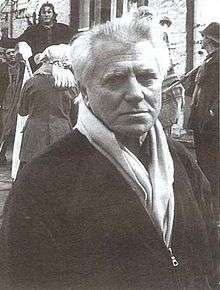Gwyn A. Williams
| Gwyn A. Williams | |
|---|---|
 Professor Gwyn A. Wiliams | |
| Born |
Gwyn Alfred Williams 30 September 1925 Dowlais, Wales |
| Died |
16 November 1995 (aged 70) Cardiff, Wales |
| Occupation | Professor, Historian, Presenter |
| Language | English |
| Nationality | British |
| Ethnicity | Welsh |
| Alma mater | University College Wales, Aberystwyth |
Gwyn Alfred "Alf" Williams (30 September 1925 – 16 November 1995) was a Welsh historian particularly known for his work on Antonio Gramsci and Francisco Goya as well as on Welsh history.
Life
Williams was born in the iron town of Dowlais situated above the industrial metropolis of Merthyr Tydfil. He attended the Cyfarthfa Grammar School and later read History at University College Wales, Aberystwyth. During World War II, he joined the British Army and fought at Normandy. Williams received his doctorate for a dissertation later published as Medieval London: from commune to capital.Gwyn was also a committed Marxist however he became disillusioned with the Russian system following the atrocities committed by Stalin.
Career
In 1954, Williams was appointed Lecturer in Welsh History at Aberystwyth University where he worked with another historian of Wales David Williams. He left Aberystwyth for the University of York where he was Chair of History from 1965 to 1974. He moved back to Wales in 1974, becoming Professor of History at the University of Wales, Cardiff, where he stayed until his retirement in 1983. Throughout his career, Williams was known as an exciting lecturer, capable of drawing large crowds from across the university. After his retirement, he continued to write, but he focused more and more on television and film, presenting, with Wynford Vaughan-Thomas, a 13-part series in 1985 by HTV and Channel 4 on Welsh history entitled The Dragon Has Two Tongues.
Williams was also a supporter of Republicanism; and later a member of Plaid Cymru, he praised the anti-monarchy book The Enchanted Glass by Tom Nairn.[1] In 1983 Williams took early retirement from his Chair at Cardiff and began making films with Teliesyn, an independent Welsh broadcasting company based in Cardiff. He eventually moved from Cardiff to the village of Dre-fach Felindre, in Carmarthenshire.[2]
Publications
- Medieval London, 1963
- Artisans and Sans-Culottes, 1968
- Proletarian Order, 1975
- Goya and the Impossible Revolution, 1976
- Merthyr Rising, 1978
- Madoc: The Making of a Myth, 1979
- The Search for Beulah Land: the Welsh and the Atlantic Revolution, 1980
- The Welsh in Their History, 1982
- When Was Wales?, 1985
- Excalibur: the Search for Arthur, 1994
References
- ↑ " We can no longer dodge the central issue of the monarchy.How can we cut free of its tentacles?... Tom Nairn's "quiet republicanism" can start us off". Gwyn A. Williams, Review of The Enchanted Glass by Tom Nairn. Marxism Today, July 1988. (p. 43)
- ↑ "OBITUARY: Gwyn A. Williams". The Independent. Retrieved 2016-01-15.
- Smith, Dai (Spring 1996). "Gwyn A. Williams, 1925–1995". History Workshop Journal. Oxford: Oxford University Press. 41: 306–312.
- Stephens, Meic (18 November 1995). "Obituary: Gwyn A. Williams". The Independent. London. Retrieved 11 December 2009.